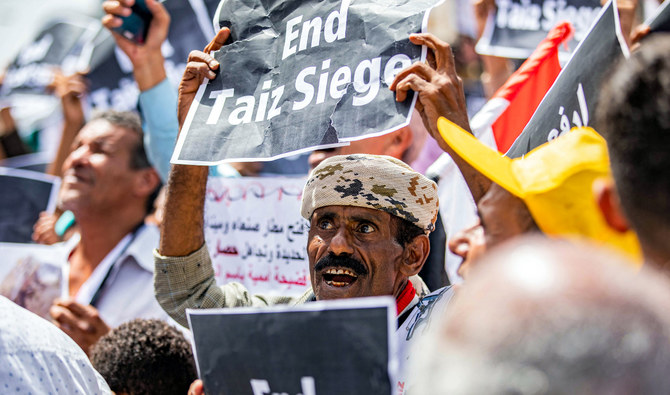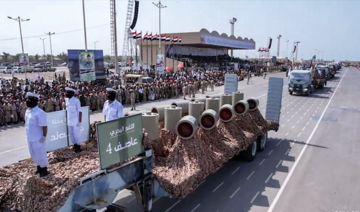AL-MUKALLA, Yemen: The head of Yemen’s Presidential Leadership Council, Rashad Al-Alimi, has vowed to use force or peaceful means to relieve the Houthi siege of Taiz, make further concessions to ease the country’s humanitarian crisis, and support any rebellion against the Houthis.
Speaking to Yemenis on the 60th anniversary of September Revolution Day on Sept. 26, the Yemeni leader said that the world is more persuaded than ever that the Houthis cannot bring about peace owing to their persistent resistance to requests to open highways in Taiz, violations of the truce, and military parades.
“The world is now more convinced than ever that this type of people cannot bring peace,” he said, adding that the Houthi oppressive rule and “racist” ideologies would spark a new revolution similar to the one against the imams in northern Yemen on Sept. 26, 1962.
“If there is one place in this era where a revolution is still needed, it is without a doubt our provinces, which are under the coercive authority of Houthi militias — a revolution for equal citizenship and justice, for the future that our people deserve.”
Al-Alimi promised to use the southern city of Aden as a base for assisting popular resistance against the Houthis, while also reiterating that his administration would uphold the cease-fire and cooperate with nonviolent efforts to end the war in Yemen.
“Our faith in you has never wavered, and we are confident that the renewed battle we are waging together will result in a bright future, beginning from the city of Aden and the liberated governorates.”
Houthis have repeatedly refused to end their siege of Taiz or cease their deadly attacks on government-controlled areas and have been mobilizing forces outside key cities since the UN-brokered truce came into effect on April 2.
Roads in Taiz, Al-Alimi said, will be opened by hook or by crook.
Despite Houthi violations of the truce, the Yemeni government allowed commercial flights from Sanaa airport to carry approximately 24,000 people and more than 50 fuel ships carrying over 1 million tons of fuel to enter Hodeidah port. The government also recently approved additional measures to expedite ship arrivals to Houthi territory.
“We will not hesitate to respond to any humanitarian appeal made by our oppressed people in militia-controlled areas,” Al-Alimi said.
Al-Alimi stated that the country’s eight-man presidential council is working collaboratively to address thorny issues such as paying salaries, fixing problems with basic services, and revitalizing the economy, promising to visit liberated provinces to launch critical projects.
“I have told you on numerous occasions that our choice is a success, that we always derive our confidence from your patience and awareness, and that despite the differences, this council is continuing to achieve your aspirations,” he said.
The revolution anniversary on Sunday and Monday sparked a flurry of celebratory activities, primarily in the besieged city of Taiz and the central city of Marib, where people lit torches, held parades in the streets, and raised Yemeni flags on their homes and public institutions. Smaller celebrations were held in Houthi-controlled areas, where people defied the Houthis by lighting fireworks and raising the Yemeni flag.
The Houthis usually pushed people to commemorate their Sept. 21 military coup anniversary and discouraged celebrations of the Sept. 26 revolution.
The militia abducted dozens of people who were celebrating the anniversary of the revolution in Sanaa, Ibb, and Thamar on Sunday, according to local media reports and social media accounts.
Yemeni observers say that the increasing number of revolution celebrations in Houthi areas is a sign of the public’s growing dissatisfaction with the movement.
“I have never seen people celebrate the Sept. 26 anniversary of the revolution this way, including in Houthi-controlled areas,” Nadwa Al-Dawsari, a Yemeni conflict analyst, told Arab News.
“I think it is a message to the Houthis that Yemenis will not accept going back to a theocracy or the version of the imamate that the Houthis are trying to build. It is a statement of resistance to and rejection of the Houthi rule,” she said.














